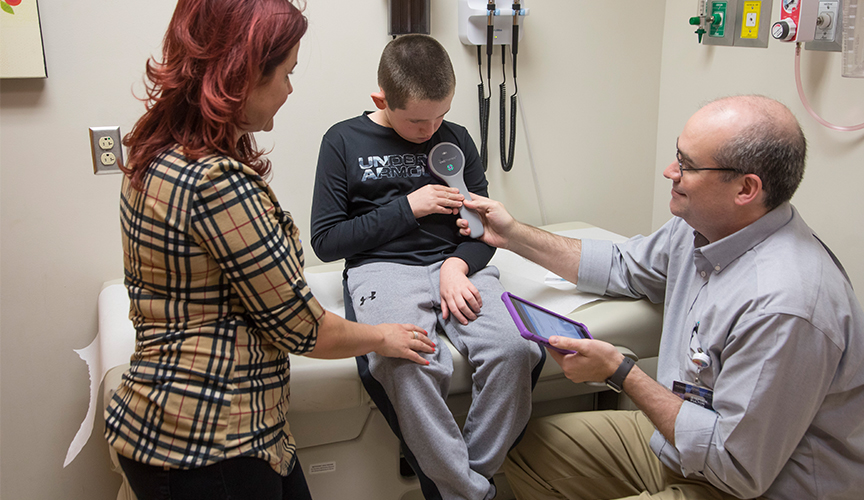Dravet on Trial
“I’m the type of mom that if there’s a cure for my son and I have to go to Antarctica to get it, I’m going tomorrow,” says Crystal Byrd, mother to 11-year-old Charlie who was diagnosed with Dravet syndrome at 2 years old.
So now Crystal and Eric Byrd of West Liberty, Ky., gladly make the nine-hour journey to Le Bonheur so that Charlie can participate in the Fenfluramine trial for Dravet syndrome – the only medication that successfully keeps his seizures under control.
Charlie began to have seizures after his first round of childhood vaccinations. Thinking they were febrile seizures, the Byrds weren’t concerned until his seizures started again just a few months later. This time, they were referred to a local epileptologist for diagnosis and treatment.
The symptoms were clear and a genetic test confirmed – Charlie had Dravet syndrome. But standard epilepsy treatments weren’t controlling Charlie’s seizures.
After three years on various medications, Crystal and Eric knew their son needed more specialized care. Researching online, Crystal found eight hospitals recommended by the Dravet Foundation – the Byrds chose Le Bonheur.
“It was perfect,” says Crystal of their first experience. “Le Bonheur was such a different and more welcoming atmosphere. We wanted to stay forever!”
Neurologist Stephen Fulton, MD, worked steadily to get Charlie the treatment that would be most effective. His seizures stabilized, and he was able to avoid hospitalization. However, as he grew older, his seizure pattern changed, and the increasing medication dose was no longer effective in seizure control.

So in 2013, Charlie underwent surgery for a vagus nerve stimulation (VNS) implant. He responded well – his mood improved, but he was still having nocturnal seizures, which pose the highest risk of death for someone like Charlie. So Fulton decided that it was time to get Charlie into a brand new drug trial – ZX-008 (fenfluramine hydrochloride) oral solution.
“Charlie’s seizures were extremely difficult to control and quite dangerous,” says Fulton. “It was an easy decision to talk to his family about the current trials for Dravet syndrome as they had so much potential for better seizure control than previous therapies.”
At first, the Byrds came to Le Bonheur twice a month in order to initiate participation in the trial. Various tests, including blood work, EKGs, ECHOs and more, determined if Charlie qualified and established a baseline for his health and seizure patterns. Crystal also had to track everything for the drug trial – when he had seizures, what kind of seizures he had, when he received medication and any other health concerns.
Tracee Ridley-Pryor, DNP, APRN, PMHNP-BC, is director of Research for the University of Tennessee Health Science Center Pediatric Neurology and oversees the current trials for Dravet syndrome while also investigating new trials for current and future patient participation.
“Every clinical trial requires a review of inclusion and exclusion criteria to evaluate which patients would be best suited for a clinical drug trial,” says Ridley-Pryor. “The most rewarding part is seeing patients make strides that parents weren’t even sure were
attainable.”
Beginning at the lowest dose, Charlie has slowly increased his medication so that he now takes the maximum dosage permitted. He has not experienced any side effects during his three years on the trial and had a 90% reduction in his seizures – where he use to have 24 to 30 seizures a month, he now has one or two.
“We are so thankful for Dr. Fulton,” says Crystal. “At first the trial was overwhelming, but we know we have a knowledgeable health care team with Charlie’s best interest at heart, who will be on top of all the details of the trial.”
But Crystal is holding out hope for one more drug for Charlie – a DNA therapy drug that could potentially address his Dravet syndrome at the genetic level. This drug would correct the genetic mutation that leads to seizures and other symptoms Charlie and children like him have to wrestle with.
“Someday his disease may not affect anybody, but we’ll never get there if we don’t have people actively engaging in trials like these,” says Crystal. “I wouldn’t recommend a drug trial just anywhere, but at Le Bonheur the communication and support are incredible. Sometimes you get scared, but I know that I have somebody who I can talk to who will return my calls and concerns within minutes.”
Zogenix Clinical Trials
- ZX008-1501: two fixed doses of ZX008 oral solution as adjunctive therapy in children and young adults with Dravet syndrome
- ZX008-1503: an open-label extension trial to assess the long-term safety of ZX008 oral solution in children and young adults with Dravet syndrome
- ZX008-1800: expanded access program for ZX008 oral solution as adjunctive therapy in patients with Dravet syndrome
- ZX008-1900: an open-label extension trial to assess the long-term safety of ZX008 oral solution as an adjunctive therapy for seizures in patients with rare seizure disorders such as epileptic encephalopathies including Dravet syndrome and Lennox-Gastaut Syndrome
- Preparation is underway for a Phase I/II study as to whether the drug can help safely prevent seizures from happening with fewer side effects.
Help us provide the best care for kids.
Le Bonheur Children's Hospital depends on the generosity of friends like you to help us serve 250,000 children each year, regardless of their family’s ability to pay. Every gift helps us improve the lives of children.
Donate Now






